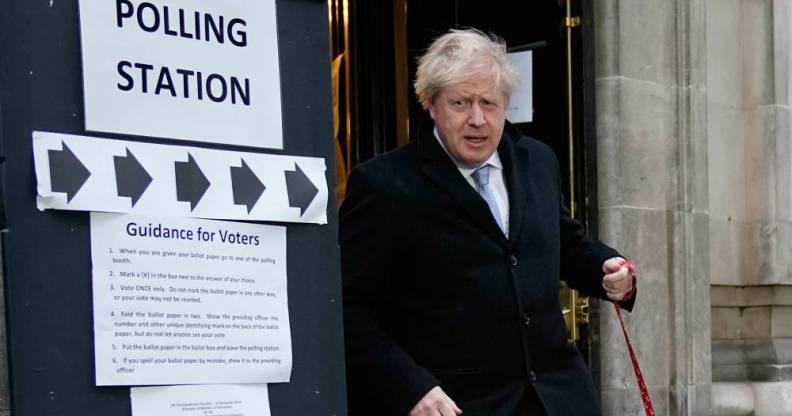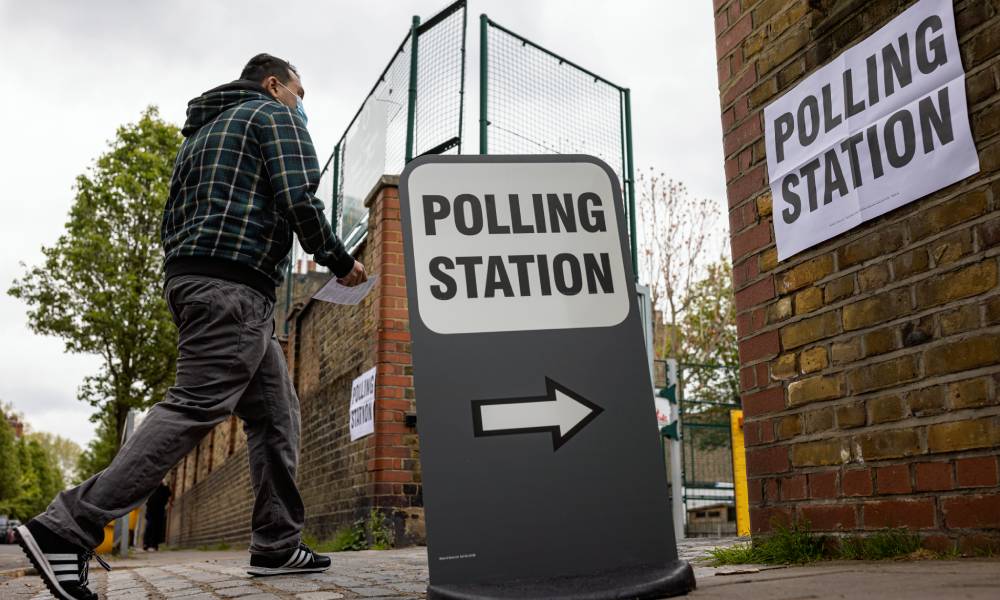Tories’ ‘pointless’ voter ID law could disenfranchise trans, disabled and Black Brits

Prime minister Boris Johnson poses outside Methodist Hall polling station as he cast his vote on 12 December 2019 in London, England. (Getty/Christopher Furlong)
Boris Johnson’s plans to introduce mandatory voter ID risks alienating trans, Black and disabled voters turning out at elections, a cross-party group of MPs has warned.
The Commons Public Administration and Constitutional Affairs Committee (PACAC) has urged the Tory government to stop the passage of the Elections Bill, which would make photo ID mandatory at polling stations in the UK.
Citizens would be required to show a driving license; UK, Commonwealth or European Economic Area passport, or other form of ID. Those without appropriate ID would be able to apply for a newly-created Voter Card.
A PACAC report, released on Monday (13 December), raised concerns about the photo ID requirement posed in the bill. The committee said the requirement “will introduce a barrier preventing some people from exercising their vote”.
Earlier this year David Davis, a former Tory cabinet minister, told The Independent that ID checks at polling stations are nothing more than an “illiberal solution in pursuit of a non-existent problem”. He dubbed the proposal “unnecessary” and “pointless”.
Big Brother Watch, a civil liberty group, found that in the 2017 general election just a single conviction of in-person voter fraud took place. That year saw 44.6 million votes cast in what was one of the highest voter turnouts in 20 years.
The PACAC report noted that similar measures introduced in Northern Ireland in 2003 resulted in a 2.3 per cent reduction in voter turnout in the first Assembly election. The PACAC said the trends were not monitored after that election, but the committee worried that the UK-wide introduction “could potentially mean over a million facing difficulties at polling stations”.
William Wragg, chair of the committee, described “seeking to secure the UK elections from potential voter fraud” through the photo ID requirement as a “noble cause”.
But Wragg said the committee felt the elections bill still lacks a “sufficient evidence base, timely consultation” and “transparency, all of which should be addressed before it makes any further progress”.
“We cannot risk any reduction of trust in UK elections, which is why the majority of the committee is calling for the bill to be paused to give time for more work to be done to ensure the measures are fit for purpose,” Wragg added.
The report added voter ID would “remove an element of the trust inherent in the current system” and make voting more difficult for people from the LGBT+ community, people with disabilities as well as voters from Black communities and other people of colour.
“The LGBT Foundation for example raised concerns about transgender voters and non-binary voters being able to access appropriate forms of ID,” the report stated.
The committee added that trans charity Mermaids said that “they think that the introduction of voter ID would ‘act to indirectly disenfranchise many trans people in the UK’.”
Stonewall also expressed its concern that the photo ID requirement “risks disenfranchising marginalized communities – including those who are LGBTQ+”, the report said.

A man walks into a polling station at Walnut Tree Walk Primary School on 6 May 2021 in London, England. (Getty/Rob Pinney)
The committee reported it had also received concerns from the Runnymede Trust, a race equality think tank, that introducing a voter ID requirement would “add further barriers to voting for Black and ethnic minority groups who are already less likely to be registered to vote and significantly less likely to hold forms of ID such as a driving licence”.
Sense, a national charity that supports people with complex disabilities, told the PACAC that it was concerned the requirement could “make it harder for some disabled people to vote”.
“While the bill’s broad definition of photographic ID does partly mitigate the disproportionate effect on disabled people, any additional barrier could discourage more disabled people from getting involved in elections,” Sense told the committee.
A department for levelling up, housing and communities spokesperson told the Mirror that the UK “should not be complacent when it comes to ensuring our democratic process remains secure”.
“Our elections bill will stamp out the potential for voter fraud, and will bring the rest of the UK in line with Northern Ireland, which has had photo identification to vote in elections since 2003,” the spokesperson said.
They added: “The UK government will be providing additional funding to cover the costs of implementing our reforms, and voters who do not have one of the required forms of photographic identification can apply for a free local Voter Card.”

